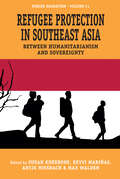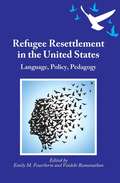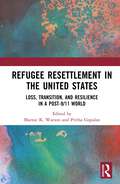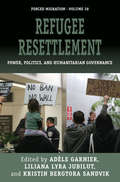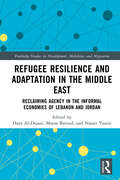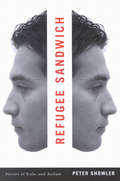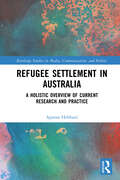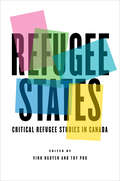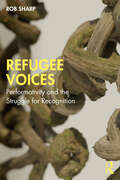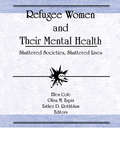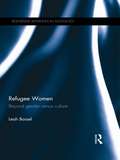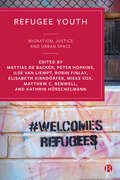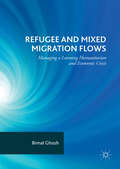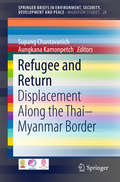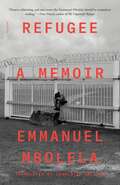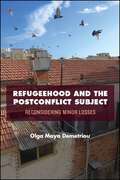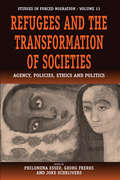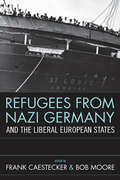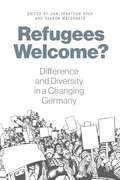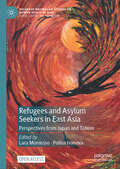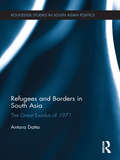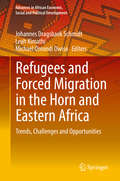- Table View
- List View
Refugee Protection in Southeast Asia: Between Humanitarianism and Sovereignty (Forced Migration #51)
by Max Walden Susan Kneebone, Reyvi Mariñas, Antje MissbachDespite being long-term hosts to refugee populations, Indonesia, Thailand and Malaysia are not yet part of the 1951 Refugee Convention. In all three states, refugees are regulated as discretionary humanitarian exceptions to immigration legislation. With contributions from scholars within and outside the region, this book promotes new thinking on protection of refugees and on resolving tensions between states, actors and institutions in the region. It evaluates the key concepts of sovereignty, security and humanitarianism in this context, the different bases of protection by state and non-state actors and the meaning of responsibility and regionalism in Southeast Asia.
Refugee Repatriation
by Megan BradleyVoluntary repatriation is now the predominant solution to refugee crises, yet the responsibilities states of origin bear towards their repatriating citizens are under-examined. Through a combination of legal and moral analysis and case studies of the troubled repatriation movements to Guatemala, Bosnia and Mozambique, Megan Bradley develops and refines an original account of the minimum conditions of a 'just return' process. The goal of a just return process must be to recast a new relationship of rights and duties between the state and its returning citizens, and the conditions of just return match the core duties states should provide for all their citizens: equal, effective protection for security and basic human rights, including accountability for violations of these rights. This volume evaluates the ways in which different forms of redress such as restitution and compensation may help enable just returns, and traces the emergence and evolution of international norms on redress for refugees.
Refugee Resettlement in the United States
by Vaidehi Ramanathan Emily M. FeuerhermThis edited volume brings together scholars from various disciplines to discuss how language is used by, for, and about refugees in the United States in order to deepen our understanding of what 'refugee' and 'resettlement' mean. The main themes of the chapters highlight: the intersections of language education and refugee resettlement from community-based adult programs to elementary school classrooms; the language (of) resettlement policies and politics in the United States at both the national level and at the local level focusing on the agencies and organizations that support refugees; the discursive constructions of refugee-hood that are promulgated through the media, resettlement agencies, and even the refugees themselves. This volume is highly relevant to current political debates of immigration, human rights, and education, and will be of interest to researchers of applied linguistics, sociolinguistics, anthropology, and cultural studies.
Refugee Resettlement in the United States: Loss, Transition, and Resilience in a Post-9/11 World
by Marnie K. WatsonThis book focuses on refugee resettlement in the post-9/11 environment of the United States with theoretical work and ethnographic case studies that portray loss, transition, and resilience. Each chapter unpacks resettlement at the macro or micro scale, underscoring the multiple, and mostly unsupported, negotiations refugees must undertake in their familial, social, educational, and work spheres to painstakingly reconstruct and reintegrate their lives. The contributors show how civil society groups and individuals push back against xenophobic policies and strive to support refugee communities, and how agentive efforts result in refugees establishing stable lives, despite punishing odds. This volume will be of interest to anthropologists and other scholars with a focus on refugee and migration studies.
Refugee Resettlement: Power, Politics, and Humanitarian Governance (Forced Migration #38)
by Adèle Garnier Liliana Lyra Jubilut Kristin Bergtora SandvikExamining resettlement practices worldwide and drawing on contributions from anthropology, law, international relations, social work, political science, and numerous other disciplines, this ground-breaking volume highlights the conflicts between refugees’ needs and state practices, and assesses international, regional and national perspectives on resettlement, as well as the bureaucracies and ideologies involved. It offers a detailed understanding of resettlement, from the selection of refugees to their long-term integration in resettling states, and highlights the relevance of a lifespan approach to resettlement analysis.
Refugee Resilience and Adaptation in the Middle East: Reclaiming Agency in the Informal Economies of Lebanon and Jordan (Routledge Studies in Development, Mobilities and Migration)
by Haya Al-Dajani Nasser Yassin Maysa BaroudThis edited volume investigates how refugee communities in the Middle East have adapted to secure their livelihoods within the informal economy. Focusing on Lebanon and Jordan, which between 2011 and 2020 received more refugees as a proportion of their population than any other countries in the world, this edited volume investigates the informal mechanisms that Syrian refugees have adopted to fit into the informal economies of Lebanon and Jordan in the face of significant challenges and barriers. The volume investigates how legality, temporality, connectedness, gender, and geography, among other factors, have influenced the emergence of refugee communities’ informal adaptive mechanisms. Drawing on in-depth, original research among Syrian refugee tribal communities, agricultural workers, female-headed households, and micro-entrepreneurs, the volume provides tangible policy and practice recommendations to help to improve the situation of refugees and vulnerable populations that are employed in the informal economy. Highlighting the resilience and agency demonstrated by refugees, this edited volume’s original community-based analysis will be of interest to students, researchers, and professionals from across Middle East studies, refugee studies, informal labor economics, and development studies.
Refugee Roulette
by Edward M. Kennedy Philip G. Schrag Andrew I. Schoenholtz Jaya Ramji-NogalesThrough the Refugee Act of 1980, the United States offers the prospect of safety to people who flee to America to escape rape, torture, and even death in their native countries. In order to be granted asylum, however, an applicant must prove to an asylum officer or immigration judge that she has a well-founded fear of persecution in her homeland. The chance of winning asylum should have little if anything to do with the personality of the official to whom a case is randomly assigned, but in a ground-breaking and shocking study, Jaya Ramji-Nogales, Andrew I. Schoenholtz, and Philip G. Schrag learned that life-or-death asylum decisions are too frequently influenced by random factors relating to the decision makers. In many cases, the most important moment in an asylum case is the instant in which a clerk randomly assigns the application to an adjudicator. The system, in its current state, is like a game of chance.Refugee Roulette is the first analysis of decisions at all four levels of the asylum adjudication process: the Department of Homeland Security, the immigration courts, the Board of Immigration Appeals, and the United States Courts of Appeals. The data reveal tremendous disparities in asylum approval rates, even when different adjudicators in the same office each considered large numbers of applications from nationals of the same country. After providing a thorough empirical analysis, the authors make recommendations for future reform. Original essays by eight scholars and policy makers then discuss the authors' research and recommendationsContributors: Bruce Einhorn, Steven Legomsky, Audrey Macklin, M. Margaret McKeown, Allegra McLeod, Carrie Menkel-Meadow, Margaret Taylor, and Robert Thomas.
Refugee Sandwich
by Peter ShowlerShowler uses satire to expose the prejudices, myopia, ignorance, provincialism, and lack of sensitivity that mark the decisions of officials. Refugee Sandwich attacks the patronage-based system of appointment and re-appointment and its sometimes tragic consequences, revealing the wide gulf between legal ideal and legal fact. Against a historical analysis of human rights abuses from a dozen countries, the author offers a sympathetic rendering of the predicament of the refugee claimant as well as a critical look at some of the more common devices and abusive strategies employed by fraudulent claimants.
Refugee Sandwich: Stories of Exile and Asylum
by Peter ShowlerShowler uses satire to expose the prejudices, myopia, ignorance, provincialism, and lack of sensitivity that mark the decisions of officials. Refugee Sandwich attacks the patronage-based system of appointment and re-appointment and its sometimes tragic consequences, revealing the wide gulf between legal ideal and legal fact. Against a historical analysis of human rights abuses from a dozen countries, the author offers a sympathetic rendering of the predicament of the refugee claimant as well as a critical look at some of the more common devices and abusive strategies employed by fraudulent claimants.
Refugee Settlement in Australia: A Holistic Overview of Current Research and Practice (Routledge Studies in Media, Communication, and Politics)
by Aparna HebbaniCombining theoretical and practical information, this book presents a holistic overview of refugee settlement in Australia. It focuses on numerous critical aspects of refugee settlement which play a vital role in refugee integration into Australia. Starting with an overview of immigration history in Australia, the book then places an emphasis on 21st-century settlement of refugees.The chapters explore a gamut of topics including how culture is transmitted in refugee families, how media portrays refugees, and how to work with refugee communities in various contexts, without focusing on one specific refugee cohort/country group. This interdisciplinary angle is presented via the inclusion of voices from interviews with key refugee settlement providers, educators, former refugees, researchers, and second-generation youth from refugee backgrounds. It covers current Australia political debate and politicisation of refugees, digital technologies, the role of language in enabling successful settlement, education trajectories, social cohesion, the fractured diasporic family, and the impact of media coverage, which underpin the settlement of refugees in Australia.This is an ideal resource for advanced undergraduates, postgraduates, and scholars of refugee settlement in the disciplines of communication, media, politics and international relations, social work, education, and demographic studies, as well as government entities, policy makers, service providers, and NGOs looking to gain an understanding of the factors impacting refugee settlement in Australia.
Refugee States: Critical Refugee Studies in Canada (Cultural Spaces)
by Vinh Nguyen, Thy PhuExploring "refuge" and "refugee" as concepts that shape Canadian nation-building both within and beyond national borders, Refugee States takes an interdisciplinary and critical approach to describing how refugees articulate their relation to and defiance of official discourses. Through close examinations of refugee movements, contexts, and subjectivities, this collection reveals how Canada has relied upon the rejection and inclusion of refugees as a crucial means of statecraft. Bringing together renowned and emerging scholars from multiple disciplines, Nguyen and Phu illuminate the historical, political, and cultural conditions that produce refugees as well as the narrative of humanitarian benevolence that persists nationally and internationally. Highlighting landmark cases, the editors and contributors together develop critical refugee studies as a framework for understanding, nuancing, and critiquing the production of Canadian humanitarian exceptionalism – the international image and discourse of Canada as a liberal, tolerant, and welcoming haven for people fleeing oppression, persecution, and unfreedom. In doing so, Refugee States offers alternative modes of understanding past and present refugee passages to and within Canada, and brings to light the many ways in which refugee subjects navigate displacement, migration, and resettlement.
Refugee Voices: Performativity and the Struggle for Recognition
by Rob SharpThis book explores how participatory creative production can allow refugees to be recognized in emotional, legal and social ways. It also explains how decisions around participation in these forms of creative production can equally exclude refugee voices from the public sphere, inhibit recognition, and in fact lead to refugee misrecognition. Building on the concept of ‘performative refugeeness’, it considers how refugee voices are ambivalently enacted in alternative forms of media and considers the differences between the refugee voices expressed in and beyond them, in contexts surrounding their creation. Furthermore, it analyses the forms of refugee voices expressed in such creative projects, which encompass fiction, photography, video, audio, and/or drawing—in linear, as well as ‘messy’ and ‘interrupted’ ways—and assesses how promises of offering a voice might claim to have been fulfilled in such cases. The volume will be of great interest to scholars and researchers of migration and refugee studies, media and culture studies, performance studies and communication studies.
Refugee Women and Their Mental Health: Shattered Societies, Shattered Lives
by Ellen Cole Esther D Rothblum Oliva M EspinCurrently, there are over 15 million legally designated refugees all over the world and it is documented that 75 percent of those refugees are women, yet most of the existent literature does not focus on this group as women. Most of the literature focuses on political, economic, and social issues with very little reference to the mental health implications of the refugees’experiences as women. Refugee Women and Their Mental Health begins to fill this paucity of information on female refugees’experiences. A book of immediate interest, Refugee Women and Their Mental Health focuses on understanding the plight of women refugees around the world, with an emphasis on mental health. The book adds successful and innovative treatment and recovery models for these women survivors.Some of the chapters are written by women who are therapists/psychologists now and who have been refugees themselves. This adds additional insight into the plight and resulting mental health problems of refugee women. The chapters cover a vast range of topics: torture and sexual abuse as refugees/victims of state violence elderly women refugees immigration law and women refugees first-person narratives the transformation of identity successful creative treatment programsIt becomes clear that women refugees from all over the world under different political events and circumstances share common values and have similar mental health needs. Refugee Women and Their Mental Health explores processes of recovery from the traumas experienced by these women and offers a variety of models for the application of feminist theory to the plight of women refugees. Experienced therapists of women and those in training to be therapists will want to read this book. The topics of refugee women rarely comes up in training programs, so the information in this book is vital for therapists, policy makers, and other service providers and professors of psychology of women, immigration and social work issues, and women and mental health issues.
Refugee Women: Beyond Gender versus Culture (Routledge Advances in Sociology)
by Leah BasselDebates over the headscarf and niqab, so-called ‘sharia-tribunals’, Female Genital Operations and forced marriages have raged in Europe and North America in recent years, raising the question – does accommodating Islam violate women’s rights? The book takes issue with the terms of this debate. It contrasts debates in France over the headscarf and in Canada over religious arbitration with the lived experience of a specific group of Muslim women: Somali refugee women. The challenges these women eloquently describe first-hand demonstrate that the fray over accommodating culture and religion neglects other needs and engenders a democratic deficit. In Refugee Women: Beyond Gender versus Culture, new theoretical perspectives recast both the story told and who tells the tale. By focusing on the politics underlying how these debates are framed and the experiences of women at the heart of these controversies, women are considered first and foremost as democratic agents rather than actors in the ‘culture versus gender’ script. Crucially, the institutions and processes created to address women’s needs are critically assessed from this perspective. Breaking from scholarship that focuses on whether the accommodation of culture and religion harms women, Bassel argues that this debate ignores the realities of the women at its heart. In these debates, Muslim women are constructed as silent victims. Bassel pleads compellingly for a consideration of women in all their complexity, as active participants in democratic life. The book will appeal to students and scholars throughout the social sciences, particularly of sociology, political science and women’s studies.
Refugee Youth: Migration, Justice and Urban Space
by Mattias De Backer, Peter Hopkins, Ilse van Liempt, Robin Finlay, Elisabeth Kirndörfer, Mieke Kox, Matthew C. Benwell and Kathrin HörschelmannTelling the stories of young refugees in a range of international urban settings, this book explores how newcomers navigate urban spaces and negotiate multiple injustices in their everyday lives. This innovative edited volume is based on in-depth, qualitative research with young refugees and their perspectives on migration, social relations and cultural spaces. The chapters give voice to refugee youth from a wide variety of social backgrounds, including insights about their migration experiences, their negotiations of spatial justice and injustice, and the diverse ways in which they use urban space.
Refugee and Mixed Migration Flows: Managing a Looming Humanitarian and Economic Crisis
by Bimal GhoshThis book provides an insightful analysis of the looming refugee and mixed migration crisis in the context of four major, contemporary flows: two in west and east Europe, and one each in the Americas and Asia. The analysis, in each case, is followed by a judicious identification of the key issues involved and the presentation of a set of proposed policy responses to them. The discussion is then placed in a global setting and dovetailed with the recently launched United Nations initiative to adopt global compacts on refugees and migrants. The author brings to this book, the first of its kind, his vast experience of advising, and actively engaging with, many of the principal international organisations concerned with refugee and migration issues. This book will be of interest to researchers, students, NGOs, professional bodies, national ministries, international organisations and rights groups in the fields of economics, public finance, political economy, human rights and refugee law, and international relations and demography.
Refugee and Return: Displacement along the Thai-Myanmar Border (SpringerBriefs in Environment, Security, Development and Peace #28)
by Supang Chantavanich and Aungkana KamonpetchThis book provides essential background information on the protracted displacement of several ethnic groups along the Thai-Myanmar border before turning to an examination of whether Myanmar has now shifted into a post-conflict society, the expected challenges involved in reintegrating returnees to Myanmar, and the possibility of voluntary and sustainable repatriation. The authors conclude that, given the current, ongoing security challenges and the lack of job opportunities in Myanmar, voluntary repatriation is not yet feasible as a long-term solution. After more than 60 years of conflict and displacement, Myanmar is now in the midst of political reform. A new nominally civilian government and the promise of elections in 2015 have raised hopes of a lasting democratic transition after years of military rule. For the first time in decades, repatriation of refugees in Thailand is being discussed as a real and imminent possibility.
Refugee: A Memoir
by Emmanuel MbolelaPersecuted for his political activism, Emmanuel Mbolela left the Democratic Republic of the Congo in 2002. His search for a new home would take six years.In that time, Mbolela endured corrupt customs officials, duplicitous smugglers, Saharan ambushes, and untenable living conditions. Yet his account relates not only the storms of his long journey but also the periods of calm. Faced with privation, he finds comfort in a migrants’ hideout overseen by community leaders at once paternal and mercenary. When he finally reaches Morocco, he finds himself stranded for almost four years. And yet he perseveres in his search for the offices of the United Nations High Commissioner for Refugees—which always seem to have closed indefinitely just before Mbolela’s arrival in a given city—because it is there that a migrant might receive an asylum seeker’s official certificates.It is an experience both private and collective. As Mbolela testifies, the horrors of migration fall hardest upon female migrants, but those same women also embody the fiercest resistance to the regime of violence that would deny them their humanity. While still countryless, Mbolela becomes an advocate for those around him, founding and heading up the Association of Congolese Refugees and Asylum Seekers in Morocco to fight for migrant rights. Since obtaining political asylum in the Netherlands in 2008, he has remained a committed activist. Direct, uncompromising, and clear-eyed, in Refugee, Mbolela provides an overlooked perspective on a global crisis.
Refugeehood and the Postconflict Subject: Reconsidering Minor Losses (SUNY series in National Identities)
by Olga Maya DemetriouBeing a "refugee" is not simply a matter of law, determination procedures, or the act of flight. It is an ontological condition, structured by the politics of law, affect, and territory. Refugeehood and the Postconflict Subject explores the variable facets of refugeehood, their interconnections, and their intended and unintended consequences. Grounded on more than a decade of research on the island of Cyprus, Olga Maya Demetriou considers how different groups of "refugees" coexist and how this coexistence invites reinterpretations of the law and its politics. The long-standing political conflict in Cyprus produced not only the paradigmatic, formally recognized "refugee" but also other groups of displaced persons not so categorized. By examining the people and circumstances, Demetriou reveals the tensions and contestations within the international refugee regimes and argues that any reinterpretation that accounts for these tensions also needs to recognize that these "minor" losses are not incidental to refugeehood but an intrinsic part of the wider issues.
Refugees And The Transformation Of Societies
by Joke Schrijvers Philomena Essed Georg FrerksThe refusal or reception of refugees has had serious implications for the social policies and social realities of numerous countries in east and west. Exploring experiences, interpretations and practices of 'refugees,' 'the internally displaced' and 'returnees' in or emerging from societies in violent conflict, this volume challenges prevailing orthodoxies and encourages new developments in refugee studies. It also addresses the ethics and politics of interventions by professionals and policy makers, using case studies of refugees from or in South Asia, the Middle East, North Africa, Europe and the Americas. These illustrate the dynamic nature of situations where refugees, policy- makers and practitioners interact in trying to construct new livelihoods in transforming societies. Without a proper understanding of this dynamic nature, so the volume argues overall, it is not possible to develop successful strategies for the accommodation and integration of refugees.
Refugees From Nazi Germany and the Liberal European States
by Bob Moore Frank CaesteckerThe exodus of refugees from Nazi Germany in the 1930s has received far more attention from historians, social scientists, and demographers than many other migrations and persecutions in Europe. However, as a result of the overwhelming attention that has been given to the Holocaust within the historiography of Europe and the Second World War, the issues surrounding the flight of people from Nazi Germany prior to 1939 have been seen as Vorgeschichte (pre-history), implicating the Western European democracies and the United States as bystanders only in the impending tragedy. Based on a comparative analysis of national case studies, this volume deals with the challenges that the pre-1939 movement of refugees from Germany and Austria posed to the immigration controls in the countries of interwar Europe. Although Europe takes center-stage, this volume also looks beyond, to the Middle East, Asia and America. This global perspective outlines the constraints under which European policy makers (and the refugees) had to make decisions. By also considering the social implications of policies that became increasingly protectionist and nationalistic, and bringing into focus the similarities and differences between European liberal states in admitting the refugees, it offers an important contribution to the wider field of research on political and administrative practices.
Refugees Welcome?: Difference and Diversity in a Changing Germany
by Sharon Macdonald Jan-Jonathan BockThe arrival in 2015 and 2016 of over one million asylum seekers and refugees in Germany had major social consequences and gave rise to extensive debates about the nature of cultural diversity and collective life. This volume examines the responses and implications of what was widely seen as the most significant and contested social change since German reunification in 1990. It combines in-depth studies based on anthropological fieldwork with analyses of the longer trajectories of migration and social change. Its original conclusions have significance not only for Germany but also for the understanding of diversity and difference more widely.
Refugees and Asylum Seekers in East Asia: Perspectives from Japan and Taiwan (Palgrave Macmillan Studies on Human Rights in Asia)
by Polina Ivanova Lara MomessoThis edited volume fills a gap in current research on asylum seekers and refugees. By focusing on two East Asian countries, Japan and Taiwan, this volume offers material for comparison and reflection on an area of the world in which this theme is still relatively underdeveloped. By approaching the theme through the different perspectives of human rights, social construction through media representation and public opinion, and lived experiences, the book offers a multifaceted and sophisticated analysis of the phenomenon. The main aim of this collection is to expand current scholarship on refugee studies and offer policy recommendations on the timely topic of refugee and asylum seekers in East Asia. This is an open access book.
Refugees and Borders in South Asia: The Great Exodus of 1971 (Routledge Studies in South Asian Politics)
by Antara DattaThe crisis in East Pakistan in 1971, which preceded the birth of Bangladesh, led to ten million refugees crossing the border into India. This book argues that this massive influx of refugees within a few short months changed ideas about citizenship and belonging in South Asia. The book looks at how the Indian state, while generously keeping its borders open to the refugees, made it clear that these refugees were different from those generated by Partition, and would not be allowed to settle permanently. It discusses how the state was breaking its ‘effective’ link between refugees and citizenship, and how at the same time a second ‘affective’ border was developing between those living in the border areas, especially in Assam and West Bengal. Moving beyond the refugee narratives created by Partition, this book argues that these ‘effective’ and ‘affective’ borders generated by the refugee crisis in 1971 form part of the longer historical trajectory of the current political debate regarding ‘illegal infiltration’ from Bangladesh . It goes on to analyse the aftermath of the 1971 war and the massive repatriation project undertaken by the governments of India, Pakistan and Bangladesh to examine ways in which questions about minorities and belonging remained unresolved post-1971. The book is an interesting contribution to the history of refugees, border-making and 1971 in South Asia, as well as to studies in politics and international relations.
Refugees and Forced Migration in the Horn and Eastern Africa: Trends, Challenges and Opportunities (Advances in African Economic, Social and Political Development)
by Johannes Dragsbaek Schmidt Leah Kimathi Michael Omondi OwisoThis volume sheds new light on the refugees and forced migration at the Horn of Africa and East Africa. Adopting a multidisciplinary perspective, it traces historical, structural, and geopolitical factors to reveal the often brutal uprooting of people in a region that hosts more than three million refugees and almost six million internally displaced persons (IDPs). By doing so, it enriches our understanding of the socio-economic, geopolitical and humanitarian causes and implications of migration and population displacement.The book is divided into five parts, focusing on different drivers of involuntary displacement and people’s uprooting: The first part covers geopolitical conflicts rooted partly in the colonial and Cold War geographies. The second part then focuses on security aspects and conflicts, while the third looks at encampment and refugee policies as well as refugee agencies. Part four highlights issues of forced repatriation and human trafficking. Lastly, part five analyzes the dynamics of refugee camps.
